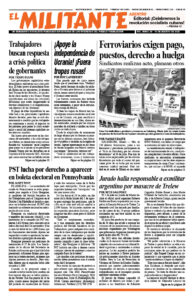Three Belarusian rail workers who could face the death penalty are going to trial facing government charges of “terrorism” and “treason.” This is part of a broader assault on the trade union movement of Belarus as the dictatorial regime of President Alexander Lukashenko tries to clamp down on opposition to Moscow’s invasion of Ukraine. The actual crime that Dzmitry Ravich, Dzyanis Dikun and Aleh Malchanau, known as the Svietlahorsk Partisans, are accused of is setting fire to a railway signal control cabinet in the Gomel region March 1.
This was four days after Russian forces, backed by the Belarus regime, used the country as one of their staging grounds for invading Ukraine. The three were arrested days afterward.
From March into April, Belarus partisans, including some rail workers, carried out dozens of actions to make tracks unusable, doing so in ways that assured no danger to train workers or others. Some drivers refused to run trains carrying Russian military equipment.
Online attacks by a group of “cyberpartisans” crippled the computerized control of the country’s rail network, creating more delays. Trainloads of arms, troops and supplies were held up for weeks. These actions by the “rail partisans” aided the valiant Ukrainian resistance that stopped and repelled Moscow’s planned assault on Kyiv.
In addition to these partisans, the Lukashenko regime has detained several leaders of Belarus’ unions, including officers of the Belarusian Congress of Trade Unions, Free Trade Union of Belarus and others.
Since March, Lukashenko’s secret police, the KGB, has arrested about 60 people for railroad disruptions. At least 11 face similar charges to the first three. The Community of Belarusian Railway Workers has been branded an “extremist group.”
The regime’s prosecutors have extended accusations of “terrorist activities” to 870 people already incarcerated. It moved April 27 to expand the death penalty law to try to deter further opposition to Moscow’s assault. Armed special forces in plain clothes have begun to patrol the rail lines.
In videos posted on a pro-Moscow Telegram channel mid-April, reminiscent of the Stalinist Moscow show trials of the 1930s, 38 rail workers “admit” to having committed acts of sabotage under “foreign influence.”
As part of backing Russian President Vladimir Putin’s war effort, Lukashenko held a sham referendum Feb. 27 to allow Russian nuclear missiles on Belarusian territory. The day of the poll, mass protests erupted in the streets of Minsk, the capital, and elsewhere. Carrying Ukrainian flags, people chanted, “No to war!” “Glory to Ukraine!” and “Long live Belarus!” The police rapidly cracked down, making more than 800 arrests in over a dozen cities.
Putin’s invasion of Ukraine is opposed by millions across Belarus. Polls show less than one in 20 support Belarusian soldiers being sent into Ukraine to fight alongside Russian forces. Even within the Belarus military brass there is opposition to joining the invasion.
The July annual conference of the Rail, Maritime and Transport union in the U.K. currently waging a strike battle of its own over jobs, wages and conditions, called for the release of the jailed and framed-up Belarusian unionists.

